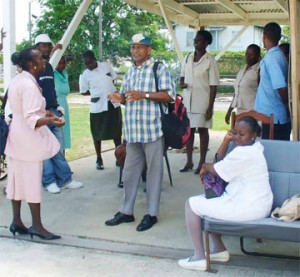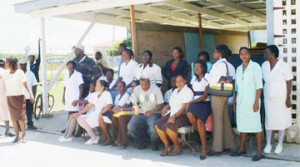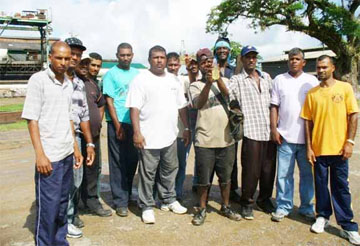Story and photos
by Shabna Ullah
Fed-up with the frequent, unscheduled blackouts and water shortages that have been plaguing Berbicians for almost one month, staff of the Fort Wellington Hospital and field workers of the Blairmont estate downed tools yesterday.
In the separate strike actions, which commenced around 7 am and 8 am respectively, the workers of both entities said they have had enough and vowed not to return to work until “we get a genuine answer from the relevant authorities”.

A worker from Guysuco declared, “We want the authorities to know how much this is affecting us… If the situation does not get better and it comes to it, we would get others to join us and have a mass demonstration. It is frustrating everyone in the area.”
They pointed out that their grievances are not with Guysuco or the Guyana Agricultural Workers Union (GAWU) but with “GPL which is also causing us to suffer from a water shortage.”
A senior official at the Guyana Power & Light (GPL) branch at Canefield had blamed the frequent blackouts on technical problems encountered with the Skeldon Sugar Modernization Plant.
He had said that Skeldon was supposed to supply 6.5 megawatts of power to the Berbice grid but has reduced that to 4 megawatts.
The officer also admitted that part of the problem was because of emergency maintenance on GPL’s number four generating set at Canefield, East Canje.
Stabroek News learnt that the generator has a “crack on the head.” Reports are that the turbine generators at Skeldon have been down but they are now “up and running from last Sunday.”
With regard to the amount of power being sold to the Berbice grid, a Guysuco official pointed out that the GPL’s office at Number 53 Village does not have the 69 KV line to accommodate the 6.5 megawatts of electricity from Guysuco and as such can only handle 4 megawatts.
Last Saturday Prime Minister, Samuel Hinds, along with the chairman of GPL, Michael Brassington and Chief Executive Officer, Bharat Dindyal visited Berbice to discuss the blackout issue.
They had promised that depending on the progress of the repairs to the generator the situation should be back to normal by next week.
Over at the hospital, workers were concerned that a baby had to be delivered on Sunday around 11.05 pm with the use of a flambeau (bottle lamp) and a torchlight. An episiotomy also had to be performed and sutured in the darkness.
One nurse told Stabroek News, “We were told that we should send away patients from the gate because of the blackout but we could not send away the pregnant woman. The Blairmont Estate ambulance brought her and she was in the second stage of labour.”
They said that as a result of the blackouts they have also been faced with a shortage of water. They said that a generator belonging to the hospital that was down for about eight months and was only repaired during last week had already collapsed.

This newspaper was there when a technician arrived and informed Regional Health Officer (RHO), Venus Smartt that an alternator and a starter needed to be replaced on the generator. The nurses are also asking for a full-time generator operator to be appointed.
Smartt told this newspaper that she had been on leave and returned yesterday to meet the staff striking for better conditions. She said that officials from the region are trying to address some aspects of the situation and have bought 20 bottles of water for immediate relief. She also said that the technician would be purchasing the parts to get the generator working again.
According to her, a resident is contracted to deliver water to fill the tanks but has not been able to do so because of the blackouts. The RHO said that the hospital has rechargeable lights but “they do not hold the charge too long” leaving the nurses to use the bottle lamps…
When this newspaper arrived at the institution around 10 am, the nurses and other workers were sitting in the compound.
They said they had tried to cope with the blackouts and other poor working conditions but it was now time for them to speak out. They pointed out that working in the dark has caused “nurses to be stuck by needles and we were keeping silent for too long…”
Industrial Relations Officer for the Guyana Public Service Union, Ram Mangru visited the hospital yesterday to speak to the striking workers and agreed that “light and water are essential and if you don’t have that you cannot work.”
He told this newspaper that apart from staff having to work in the darkness because of blackouts and failing generator, construction work on the hospital was not properly completed but that the staff had to start working.
He said, “I am hoping that a deal can be brokered and systems are put in place or the workers would continue to be off the job. I would like the situation to be resolved speedily so that persons seeking treatment at the hospital would not continue to suffer.”
The estate workers said that they decided to “protest the way GPL treating we.” They said that when their wives got up at 4 am to cook, there would be no water.
“How can we continue to work if this situation continues? There is no current to press the children’s school clothes,” one worker said.

“GPL is not giving we a proper answer when we call to find out what time the current would come on. Sometimes they say a certain time but it would come on long before or long after.”
The workers said that in some areas they had blackout for four consecutive days. The other days, they said the electricity would be restored for a few hours but the power would be so low that the water company would not be able to supply water to them. They also said that the water is discoloured and the quality is not fit for consumption.
They also said that on Sunday Guysuco had no water to provide them for drinking purposes in the backdam and a generator proved to be inadequate to pump the water. They claimed that GPL had to be summoned to put on the power and “as soon as the tanks full up the power cut off.”
Stabroek News also spoke to a few housewives in East and West Berbice who said they are fed up with the situation.
“I have a lot of clothes pile up and the current is not on long enough to get water to finish washing the clothes,” one woman complained.
Further, she said, “In the nights we can’t sleep in comfort because the place is very hot and we can’t even use the fans. Yet we have to pay GPL a high bill at the end of the month.”
Another housewife told this newspaper, “This blackout situation is sickening and I wonder how long more we would have to put up with it. All my meat and other food in my refrigerator are spoiling and I have to keep dumping them.
“We are not hearing anything from the power company but we just hope that the situation would improve.”
The woman said she was unable to purchase items that need to be refrigerated and it cost extra to make daily trips to the market.
David Subnauth, chairman of the Upper Corentyne Chamber of Commerce told this newspaper,
“the situation is very disturbing knowing that we have to pay a higher rate for electricity… The small businesses especially those that sell the ice-cream and other perishables have suffered a lot of losses.”
He pointed out that “the system [at GPL is bad]; not just the generators. The whole company needs to be restructured. The company should be privatized and the local consumers should be given the opportunity to buy shares and have a say in management. We have a lot of benefits to gain from this method.”
Subnauth mentioned that “when the heads of the power company are in Georgetown they would not know what is going on around the country” and suggests that each region should have its own management committee to monitor and detect shortfalls in the systems. Prime Minister Sam Hinds and GPL management held a press conference yesterday in which they explain-ed the power situation.

